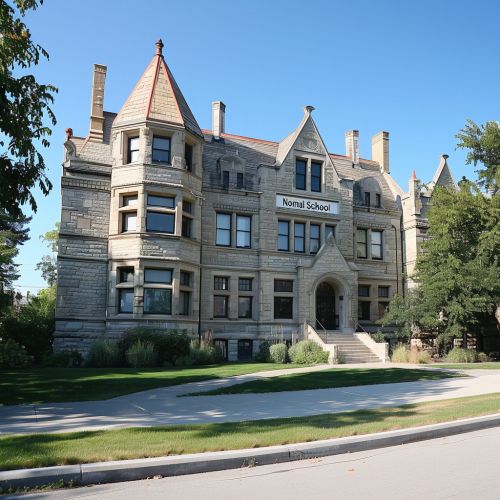Normal Superior School
Overview
A Normal Superior School, also known as a Teacher's College, is an institution of higher education that specializes in training individuals for careers in teaching. These institutions are found worldwide and have played a crucial role in the development of educational systems globally. They are typically responsible for the training of primary and secondary school teachers, although some also offer programs for early childhood educators and special education teachers.
History
The concept of the Normal Superior School originated in France during the late 18th century, with the establishment of the first École Normale in 1794. The term "normal" in this context is derived from the French word "norme", meaning standard or rule. The purpose of these schools was to establish a standard for teacher training, ensuring that all teachers had a consistent level of knowledge and skills.
Curriculum
The curriculum of a Normal Superior School typically includes a combination of academic coursework and practical training. The academic component often covers subjects such as educational psychology, pedagogy, curriculum development, and educational policy. The practical component usually involves supervised teaching practice in a real classroom setting.

Admission and Graduation
Admission to a Normal Superior School often requires a high school diploma or equivalent, and in some cases, prospective students may need to pass an entrance examination. The duration of study varies by country and program, but typically ranges from three to five years. Upon successful completion of the program, graduates are usually awarded a Bachelor of Education degree or a similar qualification, and are eligible to apply for a teaching license.
Role in Education
Normal Superior Schools play a pivotal role in shaping the quality of education in a country. They are responsible for training the teachers who will go on to educate future generations, and as such, the quality of their programs can have a significant impact on the overall standard of education.
Challenges and Criticisms
Despite their important role, Normal Superior Schools have faced various challenges and criticisms. Some critics argue that the curriculum is too theoretical and does not adequately prepare graduates for the realities of the classroom. Others point to the lack of diversity in the student body and faculty, which can limit the range of perspectives and experiences represented in the curriculum and classroom.
Future Directions
In response to these challenges, many Normal Superior Schools are implementing reforms to improve the quality of their programs. These reforms may include updating the curriculum to reflect current educational research, increasing diversity among students and faculty, and strengthening partnerships with local schools to provide more practical teaching experience.
